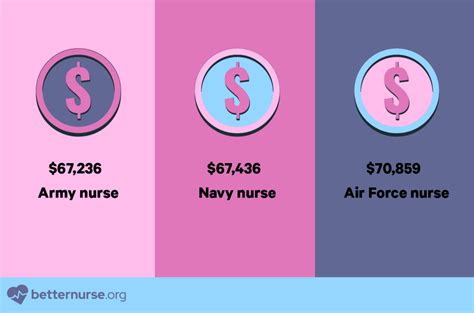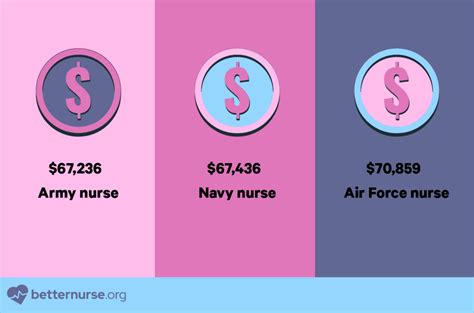Serving as a nurse in the United States Armed Forces is a unique career path that combines the challenges and rewards of clinical practice with the honor and duty of military service. It's a role that offers unparalleled leadership opportunities, global travel, and exceptional job security. But what about the salary?
For those considering this profession, understanding the compensation structure is key. A military nurse's salary is more than just a paycheck; it's a comprehensive package that often exceeds civilian equivalents, especially when considering tax advantages and benefits. A newly commissioned nurse with a bachelor's degree can expect a total starting compensation package valued between $65,000 and $85,000+ per year, depending on location, with significant and predictable growth from there.
This guide will break down the components of a military nurse's salary, the factors that influence it, and the long-term career outlook.
What Does a Military Nurse Do?

A military nurse is a commissioned officer in the Army Nurse Corps, Navy Nurse Corps, or Air Force Nurse Corps. While their core responsibilities mirror those of civilian nurses—providing direct patient care, managing treatment plans, and promoting wellness—the context is vastly different.
Military nurses practice in a variety of settings, from state-of-the-art medical centers on U.S. bases to mobile field hospitals, humanitarian aid missions, and onboard naval ships. Beyond their clinical duties, they are developed as leaders, responsible for managing enlisted medics and corpsmen, overseeing clinic operations, and making critical decisions in high-stakes environments. They are both expert clinicians and professional military officers.
Average Military Nurse Salary

Unlike a standard civilian job, a military nurse's compensation isn't a single salary figure. It's a package composed of several parts, many of which are non-taxable, making the take-home pay significantly higher than a comparable gross salary in the private sector.
The primary components are:
- Base Pay: This is the foundational, taxable income determined by rank and years of service. It is standardized across all military branches. A newly commissioned nurse with a Bachelor of Science in Nursing (BSN) typically enters as a Second Lieutenant (Army/Air Force) or Ensign (Navy), which is the O-1 pay grade. According to the 2024 military pay charts from the Defense Finance and Accounting Service (DFAS), an O-1 with under 2 years of service earns a base pay of $3,826.20 per month ($45,914 per year).
- Basic Allowance for Housing (BAH): A significant, non-taxable allowance to cover housing costs. The amount varies dramatically based on your duty station's location, rank, and whether you have dependents. For example, the 2024 BAH for an O-1 without dependents in San Diego, CA is approximately $3,291 per month, while the same officer in Fayetteville, NC would receive $1,368 per month.
- Basic Allowance for Subsistence (BAS): A non-taxable allowance to cover food costs. In 2024, the standard rate for officers is $316.98 per month.
Example First-Year Compensation (O-1, <2 years service):
Let's compare two locations to illustrate the impact of BAH:
| Compensation Component | High-Cost Location (San Diego, CA) | Lower-Cost Location (Fayetteville, NC) |
| :--- | :--- | :--- |
| Annual Base Pay (Taxable) | $45,914 | $45,914 |
| Annual BAH (Non-Taxable) | $39,492 | $16,416 |
| Annual BAS (Non-Taxable) | $3,804 | $3,804 |
| Total Annual Compensation | $89,210 | $66,134 |
While salary aggregators attempt to quantify this, it's often difficult to capture the nuance. For instance, Salary.com reports the average U.S. Army Registered Nurse salary is around $76,400, but this figure may not fully account for the value of tax-free allowances and other benefits.
Key Factors That Influence Salary

Your compensation as a military nurse is not static. It grows based on a predictable set of factors that you can plan your career around.
### Level of Education
Education directly impacts your entry rank and eligibility for special incentive programs.
- Bachelor of Science in Nursing (BSN): This is the minimum requirement to commission as a military nurse. Graduates typically enter as an O-1.
- Master of Science in Nursing (MSN): Nurses with a master's degree or significant prior experience may be eligible to enter at a higher rank, such as First Lieutenant (O-2), which comes with a higher base pay.
- Doctor of Nursing Practice (DNP): Advanced practice nurses, particularly Certified Registered Nurse Anesthetists (CRNAs), enter at a higher rank (O-2 or O-3) and receive substantial special pay, making them some of the highest-paid professionals in the Nurse Corps.
### Years of Experience
In the military, this is known as "Time in Service." Your base pay automatically increases every two years. More importantly, you become eligible for promotion. A promotion from Second Lieutenant (O-1) to First Lieutenant (O-2) typically occurs after 18-24 months, providing a significant pay raise. Promotion to Captain (O-3) follows a few years later, resulting in another major increase in base pay and BAH.
### Geographic Location
As shown in the example above, your duty station is one of the single biggest factors in your total compensation due to the Basic Allowance for Housing (BAH). A nurse assigned to a high-cost-of-living area like San Diego, Washington D.C., or Hawaii will receive a much larger non-taxable housing allowance than a nurse stationed in a rural area, drastically increasing their overall pay package.
### Company Type
In the military context, "company type" translates to the Branch of Service—Army, Navy, or Air Force. While base pay, BAH, and BAS are standardized across all branches by the Department of Defense, some differences exist:
- Accession Bonuses: Each branch may offer different sign-on bonuses to attract nurses with specific skills. These can range from $20,000 to $40,000 or more, often in exchange for a longer service commitment.
- Loan Repayment: Programs like the Health Professions Loan Repayment Program (HPLRP) can provide up to $40,000 per year toward qualifying nursing school loans.
### Area of Specialization
The military highly values nurses with specialized, high-demand skills. After an initial period of general practice, you can pursue advanced training. Holding a specialty certification often comes with Special and Incentive (S&I) Pays.
- Critical Care / ER / Perioperative: Nurses in these fields are highly sought after and may receive annual bonus payments.
- Certified Registered Nurse Anesthetist (CRNA): This is the most lucrative specialty. Military CRNAs receive significant annual incentive pays that can exceed $50,000 per year, on top of their regular officer pay and allowances.
Job Outlook

The job outlook for all Registered Nurses is excellent. The U.S. Bureau of Labor Statistics (BLS) projects that employment for RNs will grow by 6% from 2022 to 2032, which is faster than the average for all occupations. This demand translates directly to the military.
The armed forces will always need a robust corps of skilled nurses to care for service members and their families, both at home and abroad. To remain competitive with the high demand in the civilian sector, the military is committed to offering attractive compensation packages, unparalleled training opportunities, and powerful incentives like student loan repayment and graduate school funding. This ensures strong job security and a stable career path for those who serve.
Conclusion

Choosing a career as a military nurse is a decision that goes beyond salary. However, the financial compensation is robust, stable, and highly competitive.
Key Takeaways:
- It's a Package, Not a Salary: Your total compensation includes base pay, non-taxable housing (BAH) and food (BAS) allowances, and comprehensive medical care, creating a high-value package.
- Predictable Growth: Your pay increases with every promotion and every two years of service, providing a clear and reliable career financial path.
- Location Matters: Your duty station dramatically impacts your take-home pay through the BAH system.
- Specialization Pays: Earning advanced certifications, especially as a CRNA, significantly boosts your income through special incentive pays.
- Unmatched Benefits: Beyond pay, military nurses have access to a generous retirement plan (pension and TSP), 30 days of paid vacation per year, and opportunities for the military to fund their master's or doctoral degrees.
For the right individual, a career as a military nurse offers an exceptional blend of professional fulfillment, leadership development, and financial security.
